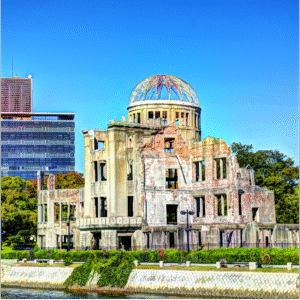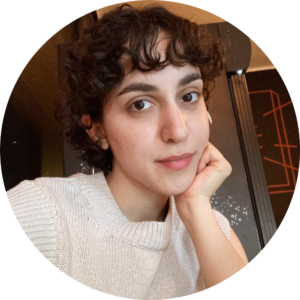Join Harbingers’ Magazine conference in Japan. August 2-13, 2025.

The Hiroshima Peace Memorial, formerly the city's Prefectural Industrial Promotion Hall, is kept in a state of ruin as a reminder of the effects of nuclear warfare.
Harbingers’ Newsroom: 80th anniversary of atomic bombings in Hiroshima & Nagasaki
On August 6 and 9, 1945, the Japanese cities of Hiroshima and Nagasaki were devastated by the world’s first and only wartime use of nuclear weapons.
The atomic bomb dropped by the United States on Hiroshima — “Little Boy” — claimed the lives of an estimated 140,000 people by the end of 1945, while “Fat Man”, dropped on Nagasaki three days later, resulted in approximately 74,000 deaths.
As 2025 marks the 80th anniversary of the beginning of the nuclear age, teenage writers from Harbingers’ Magazine meet in Japan with experienced journalists for a 10-day conference to learn and report on how commemorations in two cities destroyed and rebuilt inform the future of the Asia-Pacific region.
To apply to join the conference, please contact Harbingers’ Academy.
Programme
For ten days — five in Hiroshima and five in Nagasaki — participants will work with professional journalists from Harbingers’ Academy. Depending on their progress in Harbingers’ Magazine, they will practice:
- Reporting focuses on gathering facts, verifying information, and presenting news in a clear, objective, and engaging manner.
- Time-Sensitive Reporting challenges students to cover unfolding events under time constraints, emphasizing accuracy and clarity.
- Opinion writing teaches students how to express well-argued perspectives, balancing personal insight with journalistic integrity.
- Feature Writing (Explainer) involves breaking down complex topics into accessible, well-structured narratives that inform and educate the reader.
- Feature Writing (Analysis) enables students to explore trends and developments in-depth, connecting facts with broader societal implications.
- Feature Writing (Interview) teaches students how to conduct insightful interviews, extract compelling quotes, and construct engaging narratives around their subjects.
Written journalism forms will be supported with multimedia techniques: Podcasting and Video Reporting.
Articles will be driven by participants’ interests, knowledge, and further educational plans, ensuring their reporting contributes to their academic future. By the end of the conference, the participant will have produced a portfolio of up to three stories reflecting their unique perspective.
All articles and audiovisual materials will be published in Harbingers’ Magazine.
Part 1: Hiroshima
(Daily schedule applies to August 3-6; August 7 includes a transfer to Nagasaki)

The Hiroshima Grand Sheraton Hotel will host the first part of the conference
August 2 (Saturday) – Arrival
- All day: Arrivals and check-in at the Hiroshima Grand Sheraton Hotel, 12-1 Wakakusacho, Higashi Ward, Hiroshima, 732-0053, Japan (ensuite rooms, single occupancy)
- 18:00 – 19:30: Welcome & Inauguration Dinner
- 19:30 – 20:30: Introduction session: Lecture and workshop with Stas Skarzynski, the founder and Director of the Harbingers’ Media project.
August 3-7 – Hiroshima Newsroom
- 08:00 – 09:30: Breakfast
- 10:00 – 12:00: Journalism Workshop – Session 1
- 12:00 – 13:00: Lunch
- 13:00 – 15:00: Journalism Workshop – Session 2
- 15:30 – 18:00: Sports, sightseeing, and cultural activities
- 18:00 – 20:00: Dinner
August 7 (Wednesday)
- 08:00 – 09:30: Breakfast
- 10:00 – 12:00: Final Journalism Workshop in Hiroshima
- 12:00 – 13:00: Lunch
- 14:00: Departure to Nagasaki (private hire coach service)
Part 2: Nagasaki
(Daily schedule applies to August 3-6; August 7 includes a transfer from Hiroshima)
August 7 (Wednesday)
- 18:00: Arrival in Nagasaki, check-in at the Nagasaki Marriott Hotel, 1-1 Onouemachi, Nagasaki, 850-0058, Japan (ensuite rooms, single occupancy)
- 18:00 – 19:30: Dinner
- 19:30 – 20:30: Introduction session & conference overview
August 8-12 – Nagasaki Newsroom
- 08:00 – 09:30: Breakfast
- 10:00 – 12:00: Journalism Workshop – Session 1
- 12:00 – 13:00: Lunch
- 13:00 – 15:00: Journalism Workshop – Session 2
- 15:30 – 18:00: Sports, sightseeing, and cultural activities
- 19:00 – 20:30: Dinner
August 13 (Wednesday) – Departure
- 08:00 – 12:00: Breakfast & Departures
Conference leaders
Stas Skarzynski

“Based in Oxford, United Kingdom, Stas Skarzynski is a journalist and editor with nearly 20 years of experience.
Born in Poland in 1984, Stas was a co-founder and deputy editor-in-chief of the NGO-run fact-checking and investigative journalism outlet OKO.press, the managing editor of the Gazeta Wyborcza opinion section and its UK and international affairs correspondent. Between 2010 and 2016, he produced political interviews at Radio ZET.
He graduated from the Warsaw University’s Institute of Applied Social Sciences with a specialisation in political philosophy. His writing appeared in Die Welt, Le Figaro, and The Diplomat; he also commented for the BBC. In 2016, he won the Grand Press News Award for an investigation into corruption at the Ministry of Defence of Poland and the Green Prus Award.
In 2021, Stas founded the Oxford School for the Future and its Harbingers’ project.
“Based in Yerevan, Armenia, Tatev Hovhannisyan is an international investigative journalist and editor with 15 years’ experience.
Until August 2023, she was openDemocracy’s Europe and Eurasia editor. Her writing has appeared in numerous international media outlets, including the BBC, Euronews and the Guardian.
In 2023, she received an award from Journalists for Human Rights for investigating illegal adoptions. In 2022, she won an Emma Goldman Award for innovative research on feminist and inequality issues in Europe – the first time a journalist has won the award.
Zuzanna Bialecka

“Based in Warsaw, Poland, Zuzanna Białecka is an audiovisual artist.
Zuzanna holds a BA in media arts from the Academy of Fine Arts in Warsaw. She participated in several group and solo exhibitions in Poland (Warsaw, Lublin, Zamość, Łódź), the UK (Bristol) and Italy (Venice).
Outside of journalism, Zuzanna creates set designs and costumes for theatre productions, works as a sound engineer, and has worked as a cast director, assistant director, and script editor in the film industry.
FAQ:
Age & Language Requirements:
- The Harbingers’ Magazine Hiroshima & Nagasaki Newsroom conference is limited to eight students in pre-university education.
- The advised age is 15 and above.
- The conference is held in English. While participants are not required to provide official certification, a reasonable guideline for proficiency is IELTS 6.5 or above to ensure students can fully engage in workshops, discussions, and assignments.
- Students must have a phone and bring a laptop or tablet with a full keyboard.
Instructors & Guest Speakers:
- The Harbingers’ Academy instructors and supervisors are professional journalists and media workers, ensuring students receive high-quality mentorship throughout the programme.
- All instructors and supervisors have undergone comprehensive background checks and safeguarding training to provide a safe and supportive learning environment.
- The intended instructor-to-student ratio is 1:2, allowing for personalised guidance, direct feedback, and close engagement with each participant.
- This workshop-themed conference will feature two special lectures from Harbingers’ Academy professionals. These sessions will provide deeper insights into critical media, journalism, and storytelling topics, enriching students’ understanding of the field and expanding their perspectives.
Logistics & Travel:
- Participants will stay in single-occupancy ensuite rooms, ensuring privacy and comfort throughout the conference. The newsroom’s conference rooms are in the same hotels where attendees will be accommodated.
- The conference officially begins on August 2 in Hiroshima. For those arriving in Japan via Tokyo, we can arrange supervised transportation with the Shinkansen bullet train service from Tokyo to Hiroshima.
- At the end of the conference, we can assist with travel arrangements from Nagasaki, whether participants need transportation back to Tokyo via bullet train or flights from Nagasaki Airport.
Conference Fee:
- The conference fee covers: Participation fee (including all workshops and lectures), Full-board accommodation (single-occupancy ensuite rooms), Conference space and facilities, All travel during the conference (including Hiroshima to Nagasaki transportation), Expenses related to journalism assignments (e.g., research materials, access fees), Cultural activities (sports, sightseeing, and excursions)
- The fee does not cover: Travel and medical insurance (participants must arrange their coverage), Transportation to and from Japan (flights or other international travel), Discretionary spending (personal expenses, souvenirs, additional activities outside the program).




